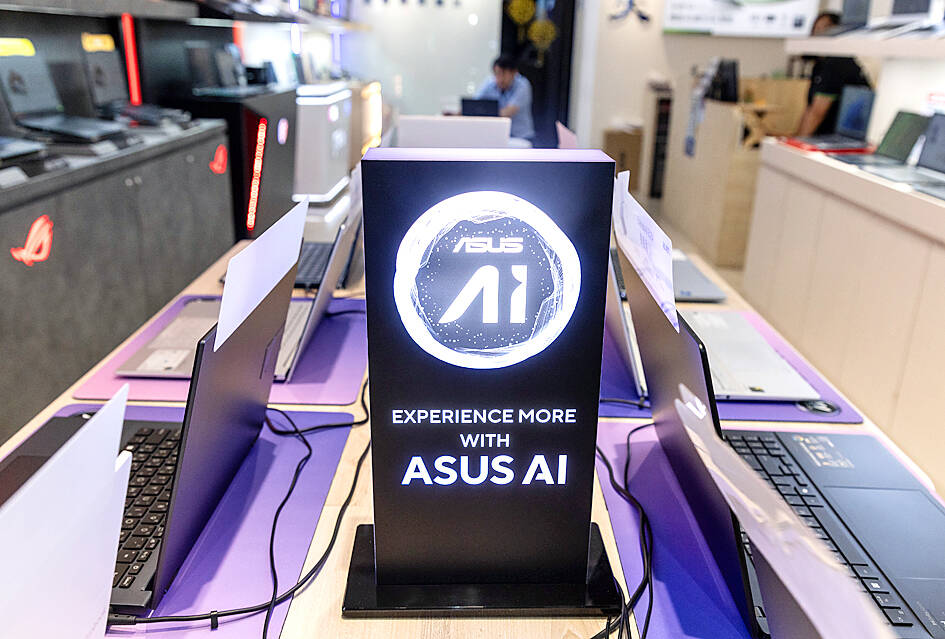The government’s business climate monitor turned “red” for December last year, suggesting an economic boom after a three-month hiatus, attributable to strong demand for electronics used in developing artificial intelligence (AI), the National Development Council (NDC) said yesterday.
The composite score rose 4 points from November last year to 38, helped by the high sales season for technology products and frontloading demand ahead of the Lunar New Year holiday, NDC Economic Department Director Chiu Chiu-ying (邱秋瑩) told a media briefing, adding that pickups in the industrial output, manufacturing sales and business confidence readings contributed to the gain.
The council uses a five-color system to depict the nation’s economic state, with “red” indicating a boom, “green” suggesting steady growth and “blue” signaling a recession. Dual colors of “yellow-red” and “yellow-blue” indicate that the economy is changing gears.

Photo: CNA
Taiwan is home to the world’s major suppliers of AI chips, servers, memory, storage and other electronic components.
Domestically, retailers and restaurants reported resilient business in line with Lunar New Year celebrations, the council said.
The index of leading indicators, which seeks to project the economic scenes in the subsequent six months, shrank 0.76 percent to 100.43, with most components — including stock prices, new construction floor space, exports outlook and money supply — losing momentum, the council said.
The readings for labor accession and imports of semiconductor equipment displayed positive cyclical movements, it added.
AI-related sectors might be overheating, warranting careful monitoring, Chiu said, adding that US President Donald Trump’s trade policy is adding to the uncertainty.
Trump has threatened to impose tariffs on semiconductors, which would be unfavorable for Taiwan’s chipmakers.
The index of coincident indicators increased 0.61 percent to 105.2 thanks to favorable cyclical movements in industrial production, imports of capital equipment, exports and overtime hours, the council said.
The advances more than offset retreats in the measures of electricity usage, as well as wholesale, retail and restaurant revenues, it said.
The council said it is confident that Taiwan’s economy would grow by more than 3 percent this year, on top of a 4.3 percent increase last year.
Chiu declined to comment on whether the “red” signal would continue, saying that “red” and “yellow-red” signals both indicate economic health.
Global trade is to rise this year, while major US technology giants have reaffirmed commitment to AI investments, a trend that would benefit local firms on the AI supply chain, she said.
Furthermore, companies at home and abroad would step up spending on low carbon migration, which would help boost private investment, she added.

JITTERS: Nexperia has a 20 percent market share for chips powering simpler features such as window controls, and changing supply chains could take years European carmakers are looking into ways to scratch components made with parts from China, spooked by deepening geopolitical spats playing out through chipmaker Nexperia BV and Beijing’s export controls on rare earths. To protect operations from trade ructions, several automakers are pushing major suppliers to find permanent alternatives to Chinese semiconductors, people familiar with the matter said. The industry is considering broader changes to its supply chain to adapt to shifting geopolitics, Europe’s main suppliers lobby CLEPA head Matthias Zink said. “We had some indications already — questions like: ‘How can you supply me without this dependency on China?’” Zink, who also

The number of Taiwanese working in the US rose to a record high of 137,000 last year, driven largely by Taiwan Semiconductor Manufacturing Co’s (TSMC, 台積電) rapid overseas expansion, according to government data released yesterday. A total of 666,000 Taiwanese nationals were employed abroad last year, an increase of 45,000 from 2023 and the highest level since the COVID-19 pandemic, data from the Directorate-General of Budget, Accounting and Statistics (DGBAS) showed. Overseas employment had steadily increased between 2009 and 2019, peaking at 739,000, before plunging to 319,000 in 2021 amid US-China trade tensions, global supply chain shifts, reshoring by Taiwanese companies and

Taiwan Semiconductor Manufacturing Co (TSMC, 台積電) received about NT$147 billion (US$4.71 billion) in subsidies from the US, Japanese, German and Chinese governments over the past two years for its global expansion. Financial data compiled by the world’s largest contract chipmaker showed the company secured NT$4.77 billion in subsidies from the governments in the third quarter, bringing the total for the first three quarters of the year to about NT$71.9 billion. Along with the NT$75.16 billion in financial aid TSMC received last year, the chipmaker obtained NT$147 billion in subsidies in almost two years, the data showed. The subsidies received by its subsidiaries —

OUTLOOK: Pat Gelsinger said he did not expect the heavy AI infrastructure investments by the major cloud service providers to cause an AI bubble to burst soon Building a resilient energy supply chain is crucial for Taiwan to develop artificial intelligence (AI) technology and grow its economy, former Intel Corp chief executive officer Pat Gelsinger said yesterday. Gelsinger, now a general partner at the US venture capital firm Playground Global LLC, was asked at a news conference in Taipei about his views on Taiwan’s hardware development and growing concern over an AI bubble. “Today, the greatest issue in Taiwan isn’t even in the software or in architecture. It is energy,” Gelsinger said. “You are not in the position to have a resilient energy supply chain, and that,